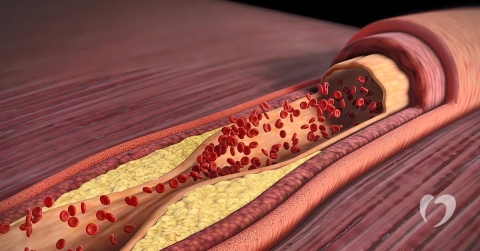Plaque in the Arteries: Causes, Symptoms, and Treatments

Buildup of plaque in the arteries is a common problem and, unfortunately, is often not diagnosed until it is already causing problems. Plaque buildup can cause narrowed arteries, also called atherosclerosis, and increase the risk of serious complications like heart attack, stroke, or even death.
Causes
Plaque is made up of waxy cholesterol, fats, and proteins that attach themselves to the walls of arteries. Cholesterol comes in two forms. Low-density lipoprotein (LDL) is the type of cholesterol that forms into plaque. High-density lipoprotein (HDL) helps carry cholesterol out of the body. The presence of LDL can trigger inflammation in the arteries. The way the body reacts to the inflammation ultimately causes other cells to create more fat and inflammation and, eventually, form a hard shell over the LDL. This is how plaque forms and builds.
There are several factors that can impact your LDL and HDL levels, including:
- Family history – High cholesterol often runs in families. Genetics determines how much cholesterol your body produces.
- Age and sex – Cholesterol increases with age, and women produce more cholesterol, particularly after menopause.
- Diet – Foods high in trans fat and saturated fat increase cholesterol. Unfortunately, highly processed foods common in the American diet are high in both.
- Exercise – Physical exertion can help lower overall cholesterol, as well as bring HDL and LDL cholesterol into better balance. A sedentary lifestyle contributes to higher cholesterol and a buildup of plaque.
Symptoms
Many times, high cholesterol carries no outward symptoms, and the buildup of plaque is discovered when the patient has a heart attack or stroke. When an artery is highly blocked, the symptoms that can occur include:
- Chest pain
- Shortness of breath
- Heart palpitations
- Dizziness or fainting
- Heart attack
Because symptoms are often absent, it is important to have cholesterol levels checked on a routine basis through blood draws and lab work. Your doctor will recommend routine screening based on your risk factors, including age, weight, and family history.
Treatments
Plaque buildup cannot be easily cured or remedied, but there are lifestyle changes that can go a long way to stabilize and slow the formation of new plaque and improve heart health.
- Eat a healthy diet – Emphasize a low-cholesterol, primarily plant-based diet, as dietary cholesterol is found in meat and animal products.
- Exercise – Experts recommend doing aerobic exercise 4 to 5 times a week for 30 minutes.
- Quit smoking – By quitting smoking, you can improve your heart health and increase your good cholesterol.
When preventative measures are not enough, plaque in the arteries is sometimes treated with a stent. A stent is a wire mesh tube that is inserted inside a narrowed artery and then expanded. This allows proper blood flow to resume and prevents further narrowing. Another treatment method involves shrinking plaque by lowering cholesterol through medication. Medications called statins lower the level of LDL (bad cholesterol) in the blood by blocking the liver enzyme that makes cholesterol.
If you have concerns about your cholesterol, reach out to OHH today to schedule an appointment with one of our specialists.




